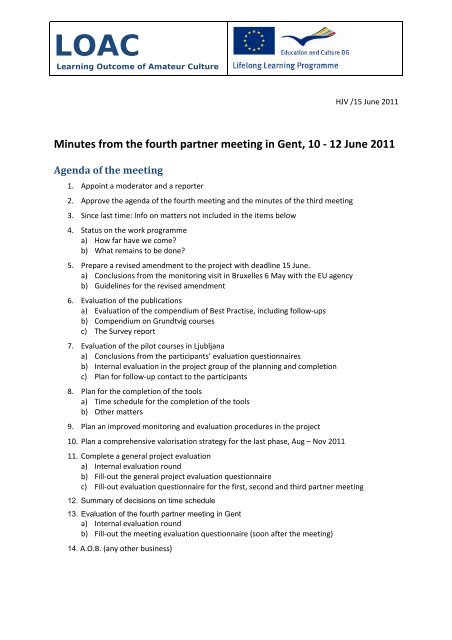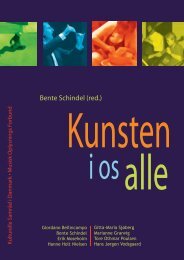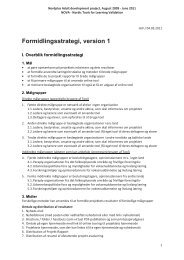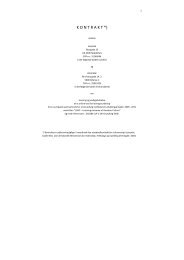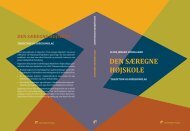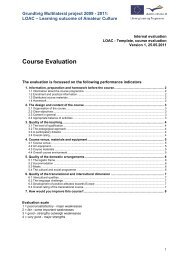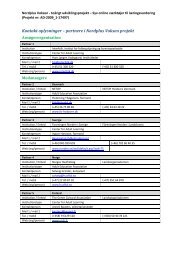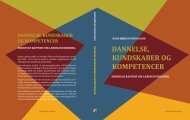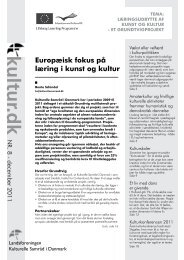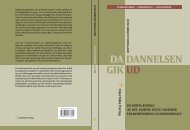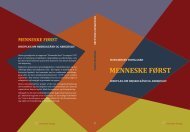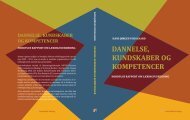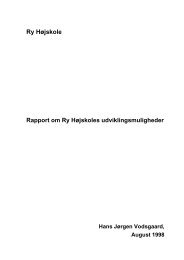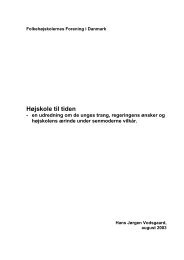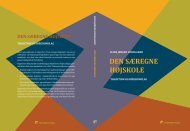Read here the Minutes from the fourth partner meeting.
Read here the Minutes from the fourth partner meeting.
Read here the Minutes from the fourth partner meeting.
Create successful ePaper yourself
Turn your PDF publications into a flip-book with our unique Google optimized e-Paper software.
LOAC<br />
Learning Outcome of Amateur Culture<br />
HJV /15 June 2011<br />
<strong>Minutes</strong> <strong>from</strong> <strong>the</strong> <strong>fourth</strong> <strong>partner</strong> <strong>meeting</strong> in Gent, 10 ‐ 12 June 2011<br />
Agenda of <strong>the</strong> <strong>meeting</strong><br />
1. Appoint a moderator and a reporter<br />
2. Approve <strong>the</strong> agenda of <strong>the</strong> <strong>fourth</strong> <strong>meeting</strong> and <strong>the</strong> minutes of <strong>the</strong> third <strong>meeting</strong><br />
3. Since last time: Info on matters not included in <strong>the</strong> items below<br />
4. Status on <strong>the</strong> work programme<br />
a) How far have we come?<br />
b) What remains to be done?<br />
5. Prepare a revised amendment to <strong>the</strong> project with deadline 15 June.<br />
a) Conclusions <strong>from</strong> <strong>the</strong> monitoring visit in Bruxelles 6 May with <strong>the</strong> EU agency<br />
b) Guidelines for <strong>the</strong> revised amendment<br />
6. Evaluation of <strong>the</strong> publications<br />
a) Evaluation of <strong>the</strong> compendium of Best Practise, including follow‐ups<br />
b) Compendium on Grundtvig courses<br />
c) The Survey report<br />
7. Evaluation of <strong>the</strong> pilot courses in Ljubljana<br />
a) Conclusions <strong>from</strong> <strong>the</strong> participants’ evaluation questionnaires<br />
b) Internal evaluation in <strong>the</strong> project group of <strong>the</strong> planning and completion<br />
c) Plan for follow‐up contact to <strong>the</strong> participants<br />
8. Plan for <strong>the</strong> completion of <strong>the</strong> tools<br />
a) Time schedule for <strong>the</strong> completion of <strong>the</strong> tools<br />
b) O<strong>the</strong>r matters<br />
9. Plan an improved monitoring and evaluation procedures in <strong>the</strong> project<br />
10. Plan a comprehensive valorisation strategy for <strong>the</strong> last phase, Aug – Nov 2011<br />
11. Complete a general project evaluation<br />
a) Internal evaluation round<br />
b) Fill‐out <strong>the</strong> general project evaluation questionnaire<br />
c) Fill‐out evaluation questionnaire for <strong>the</strong> first, second and third <strong>partner</strong> <strong>meeting</strong><br />
12. Summary of decisions on time schedule<br />
13. Evaluation of <strong>the</strong> <strong>fourth</strong> <strong>partner</strong> <strong>meeting</strong> in Gent<br />
a) Internal evaluation round<br />
b) Fill‐out <strong>the</strong> <strong>meeting</strong> evaluation questionnaire (soon after <strong>the</strong> <strong>meeting</strong>)<br />
14. A.O.B. (any o<strong>the</strong>r business)
2<br />
Annexes to <strong>the</strong> agenda<br />
Item 2:<br />
LOAC, minutes third <strong>partner</strong> <strong>meeting</strong>, hjv,25.11.2010<br />
Item 4:<br />
LOAC, task plan 2009‐2011, revised November 2010, version 3<br />
LOAC, Project description, text <strong>from</strong> application, version 1 (THE BIBLE)<br />
Item 5:<br />
Interim report to EU‐agency, Nov 2010<br />
EU agency’s approval of interim report (with critic and warnings), 1 Feb 2011<br />
See page 20 – 22, Project Handbook, Guidelines for administrative and financial management<br />
and reporting, 2009<br />
Amendment request to EU‐agency, Nov 2010<br />
EU Agency’s answer to <strong>the</strong> amendment, changes of workplan<br />
Text <strong>from</strong> <strong>the</strong> e‐mail correspondence on <strong>the</strong> report and amendment and <strong>the</strong> monitoring visit<br />
Item 6:<br />
Bente Schindel (ed.): The Compendium on Best Practise, web‐version<br />
Report on learning outcome, see article on”The learning view in <strong>the</strong> LOAC project”, 18 May 2011<br />
Item 7:<br />
Participants’ Evaluation, presentation in excel, HJV, 8 June 2011,<br />
Item 8:<br />
Manual for <strong>the</strong> online tool, version 1, HJV, 23.01.2011<br />
Guide A, edit section<br />
Guide B, <strong>the</strong> machine room<br />
Item 10:<br />
See page 23 – 27 in Project Handbook, Guidelines for administrative and financial management<br />
and reporting, 2009<br />
Outline of a revised dissemination & exploitation plan, hjv, version 1<br />
Item 11:<br />
04 LOAC ‐ Template, general project evaluation, version 1<br />
01 LOAC ‐ Template, evaluation of first <strong>meeting</strong>, version 1<br />
01 LOAC ‐ Template, evaluation of second <strong>meeting</strong>, version 1<br />
01 LOAC ‐ Template, evaluation of third <strong>meeting</strong>, version 1<br />
Item 13:<br />
01 LOAC ‐ Template, evaluation of <strong>fourth</strong> <strong>meeting</strong>, version 1
3<br />
<strong>Minutes</strong><br />
Participants:<br />
Wies Rosenboom, KF: Jan van den Eijnden; KF (left Saturday noon); Bente von Schindel, KSD; Marjeta<br />
Turk, JSKD; and Hans Jørgen Vodsgaard, IF.<br />
Item 1: Appoint a moderator and a referent<br />
HJV was appointed as moderator and as keeper of <strong>the</strong> minutes.<br />
Item 2: Approve <strong>the</strong> agenda of <strong>the</strong> second <strong>meeting</strong> and <strong>the</strong> minutes of <strong>the</strong> first <strong>meeting</strong><br />
The proposed agenda, version 1 was adopted, and <strong>the</strong> minutes <strong>from</strong> <strong>the</strong> third <strong>partner</strong> <strong>meeting</strong> were<br />
approved.<br />
Item 3: Since last time: Info on matters not included in <strong>the</strong> items below<br />
Nothing to mention<br />
Item 4: Status on <strong>the</strong> work programme<br />
After <strong>the</strong> completion of <strong>the</strong> pilot courses we have concluded phase 3 and partly phase 4, w<strong>here</strong> we<br />
must finished <strong>the</strong> different language editions of <strong>the</strong> tools and publish <strong>the</strong> three reports (w<strong>here</strong> Best<br />
practise has been published). Ultimo June <strong>the</strong> tools must be finished and primo August <strong>the</strong> three<br />
publications must be published.<br />
Then <strong>the</strong> last phase 5 remains with dissemination and exploitation, which starts primo August, and<br />
<strong>the</strong> project ends ultimo November 2011. Fur<strong>the</strong>rmore, we need to improve our procedures of monitoring<br />
and evaluation.<br />
These improvements are necessary to avoid an assessment as "weak project implementation" and<br />
consequently 25 pct. reductions of <strong>the</strong> salary budget of <strong>the</strong> EU‐grant. The initial budget had nearly<br />
140.000 euro for salary, but after <strong>the</strong> withdrawal of BKJ <strong>the</strong> total salary cost is approx. 120.000 euro,<br />
and we get 75 pct. refunding, like 90.000 euro. With a reduction of 25 pct. ‐ <strong>the</strong> total salary costs are<br />
reduced to 90.000 and <strong>the</strong> 75 pct. refunding is only 67.500 euro. Thus, <strong>the</strong> risk is a loss of 22.500<br />
euro to divide between <strong>the</strong> <strong>partner</strong>s according to <strong>the</strong>ir relative part of <strong>the</strong> total salary amount.<br />
This risk should imply that we cannot get our costs in <strong>the</strong> last phase refunded before <strong>the</strong> project reporting<br />
has been approved by EU.<br />
Item 5: Prepare a revised amendment to <strong>the</strong> project with deadline 15 June.<br />
a) Conclusions <strong>from</strong> <strong>the</strong> monitoring visit in Bruxelles 6 May with <strong>the</strong> EU agency:<br />
The first message was that we should secure higher quality in <strong>the</strong> remaining period of <strong>the</strong> project to<br />
avoid an assessment as weak implementation. The risk points are especially evaluation and <strong>the</strong> dissemination<br />
and exploitation in <strong>the</strong> last phase.<br />
b) Guidelines for <strong>the</strong> revised amendment<br />
The second message was that we needed to make a new amendment with specification of <strong>the</strong> following<br />
Work packages<br />
WP 13 and 14 regarding work load of publishing an English tool.<br />
WP 17 regarding our dissemination plan in <strong>the</strong> last phase<br />
WP 18 (management and evaluation): 2. Susana Vargas: “Please pay special attention to Evaluation<br />
and Quality Assurance activities, as <strong>the</strong>y are one of <strong>the</strong> main weaknesses of your project.<br />
The <strong>partner</strong>ship should design a new plan for Evaluation and at <strong>the</strong> final report stage, <strong>the</strong> EACEA<br />
expects to see evidence that <strong>the</strong>se activities took place.”<br />
The deadline for our revised amendment has been postponed to 15 June 2011. Decided, that HJV as<br />
coordinator can make <strong>the</strong> amendment with reference to <strong>the</strong> discussions and decisions on this <strong>meeting</strong>.<br />
BS must as representative of <strong>the</strong> beneficiary organisation sign and send <strong>the</strong> amendment.
4<br />
Item 6: Evaluation of <strong>the</strong> publications<br />
a) Evaluation of <strong>the</strong> compendium of Best Practise<br />
The Compendium has been published, and BS has distributed <strong>the</strong> Compendium to <strong>the</strong> <strong>partner</strong>ship<br />
both as paper edition and virtual edition. The compendium has also been used as course materials at<br />
<strong>the</strong> pilot Grundtvig course and workshop in Ljubljana.<br />
The course evaluations gave in general <strong>the</strong> Compendium a high mark as useful to clarify <strong>the</strong> perspective<br />
of learning outcome in amateur art and voluntary culture, however some mentioned that<br />
<strong>the</strong>y more saw <strong>the</strong> examples as examples of "good practise" and not as "best practise", because this<br />
could imply a baseline to compare <strong>the</strong> practise <strong>from</strong>.<br />
The <strong>meeting</strong> discussed whe<strong>the</strong>r <strong>the</strong> Compendium was an example of "good" or "best" practise, and<br />
whe<strong>the</strong>r we should have used a method that presented a baseline to compare with. The conclusion<br />
was that we did not need to do this, because <strong>the</strong> idea of "best practise" <strong>here</strong> was to present <strong>the</strong> use<br />
of a learning perspective (with reference to <strong>the</strong> learning view in <strong>the</strong> project) on <strong>the</strong> activities of amateur<br />
art and voluntary culture. This perspective establishes in itself new quality standards for <strong>the</strong><br />
outcome of <strong>the</strong> activities and new means of assessments. The examples may not be <strong>the</strong> best, but<br />
<strong>the</strong>y were good to present and promote <strong>the</strong> concepts of new quality standards with reference to a<br />
learning concept with focus on personal formation and a learning perspective that incorporated EU's<br />
main goals of lifelong learning.<br />
b) Compendium on Grundtvig courses<br />
The outline of <strong>the</strong> compendium is presented in <strong>the</strong> application: "The compendia on European week<br />
courses on learning dimensions of amateur culture including valuation of personal learning outcome<br />
for learners and organisational outcome for leaders and organisers of <strong>the</strong> activities. English edition.<br />
30 ‐ 40 pages. Publishing in print 900 items."<br />
This Course Compendium must be made in relation to <strong>the</strong> experiences of <strong>the</strong> two pilot courses.<br />
Bente is primarily responsible. The deadline is primo August, i.e. 8 August 2011.<br />
c) The Survey report<br />
The Report must be make with reference to <strong>the</strong> surveys in <strong>the</strong> first phase, <strong>the</strong> final tools and <strong>the</strong><br />
methodological approach presented in <strong>the</strong> article to <strong>the</strong> pilot courses: “ The learning view in <strong>the</strong><br />
LOAC project “.<br />
English edition. 60 ‐ 80 pages. Publishing in print 900 items.<br />
HJV is responsible. The deadline is primo August, i.e. 8 August 2011.<br />
Item 7: Evaluation of <strong>the</strong> pilot courses in Ljubljana<br />
a) Conclusions <strong>from</strong> <strong>the</strong> participants’ evaluation questionnaires<br />
The overall impression is very positive, but t<strong>here</strong> can be areas to improve.<br />
<br />
<br />
<br />
<br />
The course papers with practical information and course materials should have been released at<br />
least two weeks before start earlier and not just one week before.<br />
The participants asked for more knowledge of <strong>the</strong> o<strong>the</strong>r participants and <strong>the</strong>ir organisation before<br />
<strong>the</strong> course. Their presentations in Questionnaire 1, which <strong>the</strong>y send to <strong>the</strong> course leaders,<br />
could have been released to all participants before <strong>the</strong> course.<br />
The organisation of <strong>the</strong> course schedule and workshops could be improved; <strong>the</strong> common information<br />
could be clearer, and changes of <strong>the</strong> time schedule of <strong>the</strong> one‐day excursion and farewell<br />
party should have been avoided.<br />
The logistic between <strong>the</strong> hotel, meals and course venue was excellent, but <strong>the</strong> plenum room was<br />
too narrow and had a bad acoustic, <strong>the</strong> few times both groups were toge<strong>the</strong>r (Sunday Evening<br />
and Friday morning.<br />
The evaluation data and <strong>the</strong> comments <strong>from</strong> participants are presented in <strong>the</strong> attached excel‐file.
5<br />
b) Internal evaluation at <strong>the</strong> <strong>partner</strong> <strong>meeting</strong><br />
Conclusions <strong>from</strong> <strong>the</strong> internal course evaluation at <strong>the</strong> <strong>meeting</strong> were regarding<br />
Points of strengths:<br />
<strong>the</strong> learning terms and approach in LOAC gave meaning and could be used also after <strong>the</strong> course<br />
by <strong>the</strong> participants<br />
<strong>the</strong> participants saw strong possibilities in <strong>the</strong> tool and expressed interest in using it<br />
<strong>the</strong> participants had a high interest in assessment of best practise with a perspective of learning<br />
dimensions and goals.<br />
<strong>the</strong> participants could use <strong>the</strong> learning terminology of <strong>the</strong> LOAC project in <strong>the</strong>ir promoting of <strong>the</strong><br />
core values of <strong>the</strong>ir activities to main stakeholders.<br />
t<strong>here</strong> could be a broader interest /potential participants to similar Grundtvig courses after <strong>the</strong><br />
conclusion of <strong>the</strong> project<br />
<strong>the</strong> projects results thus can have an potential strong and sustainable impact, and t<strong>here</strong>fore we<br />
can plan an ambitious dissemination strategy<br />
Points of weaknesses:<br />
The division of responsibilities in <strong>the</strong> planning process was not clear enough. Too many cooks<br />
spoil <strong>the</strong> preparation and serving of <strong>the</strong> meal.<br />
The course papers were released too late to <strong>the</strong> participants<br />
The final lists of participants were not made before <strong>the</strong> start, because we missed <strong>the</strong> list of <strong>the</strong><br />
Slovenian participants.<br />
Practical information about <strong>the</strong> cultural visits and <strong>the</strong> excursion should have been released at<br />
least in <strong>the</strong> start of <strong>the</strong> courses.<br />
The instructors needed to have a <strong>meeting</strong> before <strong>the</strong> course to plan <strong>the</strong> final details of <strong>the</strong> programme<br />
Points of improvements:<br />
When independent organisations especially <strong>from</strong> different countries cooperate on providing<br />
European courses t<strong>here</strong> is a strong need for a clear division of responsibilities as well as one single<br />
course leader , who can take <strong>the</strong> final decisions of <strong>the</strong> programme and <strong>the</strong> enrolment procedure<br />
and distribution of course papers.<br />
The course information could be improved, if we have had a virtual base camp, w<strong>here</strong> <strong>the</strong> participants<br />
before course start could find and download course materials, and during and after <strong>the</strong><br />
course upload information about <strong>the</strong>ir organisations, presentations, pictures and exchange experiences<br />
and advices.<br />
c) Plan for follow‐up contact to <strong>the</strong> participants<br />
The participants' high commitment to <strong>the</strong> course objectives emphasises <strong>the</strong> need for a planned follow‐up,<br />
and we should also see <strong>the</strong> participants as potential ambassadors for <strong>the</strong> dissemination of<br />
<strong>the</strong> project results, including <strong>the</strong> planning of <strong>the</strong> three national one‐day conferences in October<br />
2011.<br />
The <strong>meeting</strong> decided that<br />
All materials including <strong>the</strong> participants' presentations <strong>from</strong> <strong>the</strong> workshops must be distributed to<br />
all participants and downloaded to <strong>the</strong> project's website.<br />
The three national organisations are responsible for collecting <strong>the</strong> presentations and o<strong>the</strong>r materials<br />
of <strong>the</strong>ir participants and for sending it to all participants and to HJV for uploads at <strong>the</strong> project<br />
website.<br />
The final list of participants with contact information (e‐mails, telephone, mobile) must be distributed.<br />
Each organisation send address lists to HJV who make and distribute a common list for<br />
all participants and instructors.
6<br />
<br />
Bente establishes a Picasa Web Album and uploads our pictures and asks <strong>the</strong> participants to upload<br />
<strong>the</strong>ir pictures as well.<br />
Kunstfactor subscribes on <strong>the</strong> "base camp‐ programme". Jan clarifies, if and how we can use this<br />
"base camp" as a common work space for <strong>the</strong> participants as a common virtual information centre.<br />
These tasks must be completed as soon as possible and latest 20 June.<br />
Item 8: Plan for <strong>the</strong> completion of <strong>the</strong> tools<br />
a) Time schedule for <strong>the</strong> completion of <strong>the</strong> tools<br />
According to <strong>the</strong> time schedule of <strong>the</strong> work <strong>the</strong> different language editions of <strong>the</strong> tool must be finished<br />
just after <strong>the</strong> completion of <strong>the</strong> pilot courses. The <strong>meeting</strong> decided that <strong>the</strong> deadline of <strong>the</strong><br />
completion of <strong>the</strong> tool was as soon as possible and latest before <strong>the</strong> start of <strong>the</strong> summer holidays of<br />
<strong>the</strong> project leaders of <strong>the</strong> consortium. The latest deadline is 25 July, w<strong>here</strong> <strong>the</strong> holiday for Marjeta,<br />
JSKD starts.<br />
b) O<strong>the</strong>r matters<br />
Each edition of <strong>the</strong> tools must include <strong>the</strong> logo of <strong>the</strong> LLL‐programme and a disclaimer. HJV contact<br />
<strong>the</strong> IT‐firm to secure this demand.<br />
Item 9: Plan an improved monitoring and evaluation procedures in <strong>the</strong> project<br />
The message <strong>from</strong> <strong>the</strong> monitoring visit in Bruxelles with EACEA was clear: We need to improve <strong>the</strong><br />
documentation/ monitoring of <strong>the</strong> project progress, we must use for <strong>the</strong> evaluation. We thus need to<br />
collect and provide documentation on <strong>the</strong> project progress until now as well as secure more elaborated<br />
documentation for <strong>the</strong> remaining part of <strong>the</strong> project.<br />
The <strong>meeting</strong> discussed <strong>the</strong> issue and decided that our our new plan for monitoring and evaluation<br />
should include:<br />
A focus on progress (formative) evaluation using primarily<br />
1) The minutes <strong>from</strong> <strong>the</strong> four <strong>partner</strong> <strong>meeting</strong>s including internal evaluation of <strong>the</strong> preceding project<br />
phase.<br />
2) The <strong>partner</strong>ship fills out evaluation questionnaires for all four <strong>partner</strong> <strong>meeting</strong>s latest 30 June.<br />
3) The evaluation questionnaires filled out by <strong>the</strong> participants at <strong>the</strong> pilot courses can be used both<br />
for progress and impact evaluation.<br />
4) A questionnaire for general project evaluation with focus on progress evaluation. This will be<br />
filled out by <strong>the</strong> <strong>partner</strong>s just after <strong>the</strong> <strong>fourth</strong> <strong>meeting</strong> and latest 30 June before <strong>the</strong> start of <strong>the</strong><br />
last and fifth project phase of valorisation and one more time at <strong>the</strong> end of <strong>the</strong> project.<br />
5) Internal reports (using common guideline for questions to answer) by <strong>the</strong> <strong>partner</strong>s <strong>from</strong> <strong>the</strong><br />
three national conferences in October 2011 used both for progress and impact evaluation<br />
6) Each <strong>partner</strong> makes a log of <strong>the</strong>ir actual valorisation activities (with reference to <strong>the</strong>ir detailed<br />
valorisation plan) in <strong>the</strong> fifth and and last project phase. This log starts <strong>from</strong> 13 May just a week<br />
after <strong>the</strong> monitoring visit in Brussels on <strong>the</strong> 6. May.<br />
7) The project coordinator makes a log of <strong>the</strong> main mail correspondence during <strong>the</strong> whole project<br />
with and by <strong>the</strong> consortium, which can be used for progress evaluation<br />
A focus on impact (summative) evaluation using<br />
8) The questionnaires and interviews in <strong>the</strong> survey phase (WP 02) with learners and learning providers,<br />
which provide documentation to <strong>the</strong> need and impact analysis<br />
9) The evaluation questionnaires <strong>from</strong> <strong>the</strong> pilot courses can be used both for progress and impact<br />
evaluation<br />
10) Fur<strong>the</strong>rmore, each <strong>partner</strong> will before August 2011 make an interview with 3‐4 participants <strong>from</strong><br />
<strong>the</strong> pilot courses (potential end users of <strong>the</strong> results) to get some extra information on <strong>the</strong> out‐
7<br />
come of <strong>the</strong> courses and <strong>the</strong> potential impact of <strong>the</strong> project results. This should be done before<br />
summer holiday and latest 25 July, so we can use <strong>the</strong> conclusions for refinements/adjustments of<br />
<strong>the</strong> dissemination plan.<br />
11) HJV make a questionnaire guide for <strong>the</strong>se interviews latest 27 June.<br />
12) Internal reports by <strong>the</strong> <strong>partner</strong>s <strong>from</strong> <strong>the</strong> three national conferences in October 2011 with focus<br />
on impact evaluation and guidelines for a sustainable exploitation of <strong>the</strong> project results.<br />
13) HJV make an questionnaire for evaluation of <strong>the</strong> valorisation activities latest Mid August, which<br />
<strong>the</strong> <strong>partner</strong>s must fill out in <strong>the</strong> start and again in <strong>the</strong> end of <strong>the</strong> valorisation phase.<br />
This documentation will be analysed and presented in <strong>the</strong> final project evaluation report, which will<br />
be an annex to <strong>the</strong> final confidential report to EACEA. Fur<strong>the</strong>rmore we will make a shorter public<br />
evaluation report as an annex to <strong>the</strong> final public report to EACEA, which will be published at <strong>the</strong> project<br />
website.<br />
Item 10: Plan <strong>the</strong> dissemination & exploitation strategy of <strong>the</strong> last phase, Aug – Nov 2011<br />
Ano<strong>the</strong>r main message <strong>from</strong> <strong>the</strong> monitoring visit in Bruxelles with EACEA was that we need to «provide<br />
concrete details regarding <strong>the</strong> dissemination activities and its channels, and especially <strong>the</strong> ones<br />
related to <strong>the</strong> English dissemination to take place in countries outside <strong>the</strong> <strong>partner</strong>ship. »<br />
In general WP 15, 16 and 17 are strongly interrelated. WP 15 and 16 have primarily focus on dissemination,<br />
while WP 17 has primarily focus on exploitation. The detail planning started at <strong>the</strong> <strong>fourth</strong><br />
<strong>partner</strong> <strong>meeting</strong> and latest 1 August each organisation must have prepared a comprehensive valorisation<br />
plan. The full plan of <strong>the</strong> three work packages includes<br />
1) That <strong>the</strong> three national umbrella organisations must complete a comprehensive dissemination and<br />
exploitation plan for <strong>the</strong>ir own country, latest 1 August.<br />
2) Each organisation has special responsibility for completing a focussed multiplication to <strong>the</strong> sector<br />
of amateur art, voluntary culture and liberal adult education and a focussed mainstreaming to decision‐makers,<br />
opinion‐formers, researchers and o<strong>the</strong>r multipliers in selected neighbour countries and<br />
European regions:<br />
KSD (DK) for <strong>the</strong> o<strong>the</strong>r Nordic countries and United Kingdom.<br />
IF (DK) for <strong>the</strong> o<strong>the</strong>r countries in The Baltic Sea Region including <strong>the</strong> Baltic States, Poland, North<br />
Germany and Northwest Russia<br />
Kunstfactor (NL) for Belgium, Germany and Northwest France<br />
JSKD (SI) for Croatia, Hungary and Austria<br />
3) Fur<strong>the</strong>rmore, <strong>the</strong> consortium has a shared responsibility for <strong>the</strong> completion of a comprehensive<br />
trans‐European dissemination and exploitation using main European network in <strong>the</strong> area of amateur<br />
art, voluntary culture and lifelong learning. We will at least use <strong>the</strong> following<br />
a) trans‐European umbrella organisations and network in amateur art and voluntary culture:<br />
• Amateo,<br />
• ENCC ‐ European Network of Cultural Centres<br />
• Trans Europe Halles ‐ Independent Cultural Centres in Europe<br />
• European Choral Association ‐ Europa Cantat<br />
b) trans‐European cultural news media:<br />
• Culture Action Europe<br />
c) trans‐European network for liberal adult education:<br />
• EAEA<br />
• BNAL<br />
• NVL<br />
d) trans‐European Research area:<br />
• Compendium of Cultural Policies and Trends in Europe<br />
• LabforCulture.org<br />
e) trans‐European network for transfer and exploitation of EU projects :
8<br />
• E.N.T.E.R<br />
• Eve<br />
The procedure of refinement of <strong>the</strong> transnational valorisation plan is that KSD make a preliminary list<br />
of target groups and send it to <strong>the</strong> <strong>partner</strong>s latest 18 June. The <strong>partner</strong>s <strong>the</strong>n propose extra transnational<br />
organisations and return <strong>the</strong> lists to KSD latest 30 June.<br />
4) Fur<strong>the</strong>rmore, <strong>the</strong> dates of <strong>the</strong> three national were decided:<br />
In Slovenia<br />
Tuesday, 18 th of October<br />
In Copenhagen Wednesday, 2 nd of November<br />
In Holland<br />
Thursday, 10 th of November<br />
The programme of <strong>the</strong> conferences must be planned and announced latest mid August. HJV was<br />
asked to participate in all three conferences as a speaker with presentations of <strong>the</strong> learning view and<br />
objectives in <strong>the</strong> LOA project.<br />
5) Finally, we decided that HJV prepare a standard template /guide for planning a comprehensive<br />
valorisation plan (including main questions regarding why, what, to whom, how, when and by whom.<br />
This template must be send to <strong>the</strong> consortium latest 27 June.<br />
Item 11: Complete a general project evaluation<br />
a) Internal evaluation round<br />
We had a comprehensive general project evaluation at <strong>the</strong> <strong>meeting</strong>. Fur<strong>the</strong>rmore we decided that<br />
each <strong>partner</strong> fill out <strong>the</strong> questionnaire for general project evaluation latest 30 June.<br />
Main statements <strong>from</strong> <strong>the</strong> oral evaluation at <strong>the</strong> <strong>meeting</strong> were <strong>the</strong> following:<br />
First main point focussed on <strong>the</strong> quality of <strong>the</strong> initial project plan:<br />
HJV mentioned that some problems of <strong>the</strong> project implementation had reference to structural weaknesses<br />
of <strong>the</strong> initial project plan and succeeding approved application (compared to <strong>the</strong> quality standards<br />
of a European multilateral development project / <strong>the</strong> advices <strong>from</strong> <strong>the</strong> new Survival Kit):<br />
• The competence profile of <strong>the</strong> consortium was too unilateral – <strong>the</strong> <strong>partner</strong>s represent nearly <strong>the</strong><br />
same area of work or expertise. It made it more difficult to plan a clear division of tasks and responsibilities.<br />
Most work packages did not have a clear lead <strong>partner</strong> with special expertise regarding<br />
this particular task. Instead all were responsible and it proved to be quite ineffective.<br />
• T<strong>here</strong> should have been a start‐up phase before <strong>the</strong> kick‐off <strong>meeting</strong>, w<strong>here</strong> conditions and demands<br />
could have been clarified, <strong>the</strong> tasks and work load for each <strong>partner</strong> could have been discussed,<br />
means of communications, rules of procedures and Partner Agreements could have been<br />
prepared, etc. Even better – we should have had a preparatory <strong>meeting</strong> to clarify <strong>the</strong> project plan<br />
before <strong>the</strong> final application.<br />
• The internal communication and use of ICT could have been more elaborated by <strong>the</strong> use of a<br />
virtual work space, common calendar, project planning software, web telephones and conferencing,<br />
etc.<br />
• The dissemination and exploitation activities should have been more integrated in all phases of<br />
<strong>the</strong> project, and not only planned for <strong>the</strong> last fifth phase of <strong>the</strong> project.<br />
• The quality assurance with monitoring, documentation and evaluation should have been more<br />
elaborated and integrated in <strong>the</strong> work programme with clear tasks and responsibilities for <strong>the</strong><br />
whole <strong>partner</strong>ship circle.<br />
WR mentioned that <strong>the</strong> issue of <strong>the</strong> project has proved to be an interesting topic for many (amateur)<br />
arts organisations, teachers and participants in all <strong>partner</strong> countries. We could learn that it is important<br />
to develop a working method for <strong>partner</strong>s so <strong>the</strong>y can be better prepared at first hand.<br />
BS mentioned that <strong>the</strong> initial project plan had shown to be very good and clear. However, t<strong>here</strong><br />
should have been a plan on <strong>the</strong> overall responsibility in relation to each work packet.
9<br />
MT mentioned that <strong>the</strong> participating organisations had a very different profile and working area.<br />
Sometimes it was difficult to find mutual interest within <strong>the</strong> project. Anyhow, we learned a lot <strong>from</strong><br />
each o<strong>the</strong>r and about different approaches to <strong>the</strong> <strong>the</strong>me.<br />
Second main point of <strong>the</strong> general evaluation focussed on <strong>the</strong> quality of <strong>the</strong> project implementation:<br />
BS mentioned that <strong>the</strong> dissemination plan should have started <strong>from</strong> <strong>the</strong> beginning of <strong>the</strong> project; and<br />
t<strong>here</strong> should have been a better evaluation procedure, w<strong>here</strong> everybody should have made a written<br />
evaluation of each <strong>meeting</strong> and every <strong>meeting</strong> should start with a discussion of <strong>the</strong> evaluation and<br />
which working tasks everyone had.<br />
JvdE mentioned that at <strong>the</strong> leave of our German <strong>partner</strong> could have had a more practical approach<br />
based on EU‐guidelines. It seemed as if we didn’t realise enough <strong>the</strong> impact of such a major change;<br />
and we weren’t able to find a suitable new <strong>partner</strong> in <strong>the</strong> available timeframe.<br />
HJV mentioned that we at <strong>the</strong> kick‐off <strong>meeting</strong> should have had a clearer focus on <strong>the</strong> <strong>partner</strong><br />
agreement and rules of procedure, especially when <strong>partner</strong>s miss to ad<strong>here</strong> to <strong>the</strong> agreed workplan<br />
and deadlines. Such rules should <strong>from</strong> <strong>the</strong> start clarify <strong>the</strong> coordinators right and obligation to reduce<br />
<strong>the</strong> degree of salary refunding <strong>from</strong> 100 pct to 0 pct in a defined period (for example a period of 30<br />
days) after <strong>the</strong> deadline, and <strong>the</strong> procedure of a faster exclusion of <strong>partner</strong>s. Instead <strong>the</strong> <strong>partner</strong>ship<br />
circle had developed a too “friendly project culture”, w<strong>here</strong> deadlines should not be taken too seriously<br />
or delays are understandable and excusable.<br />
MT mentioned that even though we have had an unreliable <strong>partner</strong> <strong>from</strong> Germany, <strong>the</strong> remaining<br />
<strong>partner</strong>ship showed a positive approach to solve <strong>the</strong> problems and to ensure <strong>the</strong> sustainability of <strong>the</strong><br />
project.<br />
The third main point focussed on <strong>the</strong> quality of project management and co‐ordination:<br />
BS mentioned that we <strong>from</strong> <strong>the</strong> beginning of <strong>the</strong> project should have clarified procedures, when<br />
<strong>partner</strong>s do not meet deadlines. It puts too heavy workload of <strong>the</strong> coordinator, when he continually<br />
has to ask for results.<br />
WR mentioned that we should have been more aware of <strong>the</strong> very important issue of language and<br />
translations; and had developed ways or give advice on how to address effectively semantic and lingual<br />
problems when working on a multilateral scale.<br />
MT mentioned that some of <strong>the</strong> project coordinators didn’t have enough time and resources to fulfil<br />
<strong>the</strong> tasks on time. However, we have had a very reliable project leader, who took all <strong>the</strong> measures<br />
needed to fulfil <strong>the</strong> tasks.<br />
HJV mentioned that <strong>the</strong> initial work programme had lacked a clear division of work and/or lead <strong>partner</strong>s<br />
for each work package, and when all are responsible <strong>the</strong> result can easily be that nobody is responsible<br />
or <strong>the</strong> process of decision making become ineffective.<br />
The <strong>fourth</strong> main point focussed on <strong>the</strong> quality of <strong>the</strong> transnational <strong>partner</strong>ship:<br />
HJV mentioned that <strong>the</strong> initial project plan had lacked an equal sharing of roles and responsibilities<br />
amongst <strong>partner</strong>s; however <strong>the</strong> equal sharing has improved during <strong>the</strong> project. From <strong>the</strong> start of <strong>the</strong><br />
project we should have used <strong>the</strong> necessary time and effort first to gain intercultural knowledge of<br />
<strong>the</strong> o<strong>the</strong>r <strong>partner</strong>s work and experiences with <strong>the</strong> project topic, and secondly to gain relevant<br />
knowledge of <strong>the</strong> state of <strong>the</strong> art and needs regarding <strong>the</strong> project topic in a trans‐European context.<br />
T<strong>here</strong>by <strong>the</strong> European added value can be better integrated <strong>from</strong> <strong>the</strong> start of <strong>the</strong> project.<br />
WR mentioned that working toge<strong>the</strong>r on a transnational scale became easier and more enjoyable<br />
during <strong>the</strong> project. Based on mutual respect and awareness of responsibilities we grew in our roles<br />
and obligations.<br />
BS mentioned that it has been a fantastic experience to work transnational with experts within you<br />
own field (though mutual). Maybe it is not possible to avoid that <strong>partner</strong>s leave <strong>the</strong> project, but<br />
maybe t<strong>here</strong> should be a fee to pay to do that. In order to avoid <strong>the</strong> situation we stood in, five <strong>partner</strong>s<br />
or more should be recommended for a project.
10<br />
MT mentioned that it had been difficult to coordinate schedules of all <strong>the</strong> <strong>partner</strong>s and <strong>the</strong> tasks;<br />
however <strong>the</strong> European dimension of <strong>the</strong> project and <strong>the</strong> mutual responsibilities had been a strong<br />
point in <strong>the</strong> project.<br />
The fifth main point focussed on <strong>the</strong> quality of our own performance and outcome:<br />
WR and JvdE mentioned that within Kunstfactor <strong>the</strong>y could have developed a better way of internal<br />
preparation before <strong>the</strong> first <strong>partner</strong> <strong>meeting</strong>. Anyhow, we took <strong>the</strong> project very seriously after <strong>the</strong><br />
first <strong>partner</strong> <strong>meeting</strong>. In a team of three we developed an efficient way of working toge<strong>the</strong>r. We had<br />
monthly <strong>meeting</strong>s regarding <strong>the</strong> continuity and progress of <strong>the</strong> project.<br />
MT mentioned that she did not have had enough time to fulfil <strong>the</strong> tasks on time, and at least at <strong>the</strong><br />
start, not enough knowledge on <strong>the</strong> topic. Her priority has been to look at <strong>the</strong> practical points of <strong>the</strong><br />
results of <strong>the</strong> project.<br />
BS mentioned that she as financial administrator could have been more demanding in terms of delivering<br />
of annexes of <strong>the</strong> German <strong>partner</strong>. Then we might have anticipated his lack of commitment in<br />
time. Fur<strong>the</strong>r she could have been in contact with <strong>the</strong> <strong>partner</strong>s more often.<br />
HJV mentioned that his performance as project coordinator of a European multilateral project can be<br />
improved:<br />
• First, by a stronger focus on <strong>the</strong> preparatory planning of <strong>the</strong> project and <strong>the</strong> start‐up phase with<br />
<strong>the</strong> objective to secure a truly multilateral consortium, a clear division of work and responsibilities,<br />
a strong commitment <strong>from</strong> all project members and <strong>the</strong>ir organisations, clear rules of procedures<br />
and internal communication, a strong integration of documentation and evaluation in<br />
<strong>the</strong> work programme, and a comprehensive valorisation plan with shared responsibilities during<br />
<strong>the</strong> whole project period.<br />
• Secondly, by coordination that combines “friendly” guidance and support to <strong>the</strong> <strong>partner</strong>s’ task<br />
solving with consequent and fast “unfriendly” sanctions, if <strong>the</strong> <strong>partner</strong>s don’t solve <strong>the</strong>ir tasks as<br />
agreed and on time.<br />
• Thirdly, by seeking useful support <strong>from</strong> external agencies and expertise and especially to get<br />
advice and secure an ongoing dialogue with EACEA, if or when problems occur and changes of<br />
plans are needed.<br />
b) Fill‐out <strong>the</strong> general project evaluation questionnaire<br />
The questionnaire for general project evaluation had been attached to <strong>the</strong> invitation to this <strong>meeting</strong>.<br />
Decided that each <strong>partner</strong> fill out <strong>the</strong> questionnaire for general project evaluation latest 30 June.<br />
c) Fill‐out evaluation questionnaire for <strong>the</strong> first, second and third <strong>partner</strong> <strong>meeting</strong><br />
The questionnaires for retrospective evaluation of <strong>the</strong> first three <strong>partner</strong> <strong>meeting</strong>s has been attach<br />
to <strong>the</strong> invitation to this <strong>meeting</strong>.<br />
Decided that each <strong>partner</strong> fill out <strong>the</strong> questionnaire for <strong>the</strong> first, second and third <strong>partner</strong> <strong>meeting</strong><br />
latest 30 June.<br />
Item 12: Summary of decisions on time schedule<br />
1) The revised amendment must be sent to EACEA latest 15 June. HJV is responsible and BS sd send.<br />
2) The tools must be translated and finished before <strong>the</strong> summer holiday and latest 25 July<br />
Each edition of <strong>the</strong> tools must include <strong>the</strong> logo of <strong>the</strong> LLL‐programme and a disclaimer.<br />
HJV contact <strong>the</strong> IT‐firm to secure this demand.<br />
3) This Course Compendium must be made in relation to <strong>the</strong> experiences of <strong>the</strong> two pilot courses.<br />
Bente is primarily responsible. The deadline is primo August, i.e. 8 August 2011.<br />
4) The report must be make with reference to <strong>the</strong> surveys in <strong>the</strong> first phase, <strong>the</strong> final tools and <strong>the</strong><br />
methodological approach presented in <strong>the</strong> article to <strong>the</strong> pilot courses: “ The learning view in <strong>the</strong><br />
LOAC‐project “. HJV is responsible. The deadline is primo August, i.e. 8 August 2011.<br />
5) Follow‐up on <strong>the</strong> pilot courses:
11<br />
a) All course materials including presentations of instructors and participants, contact list of<br />
participants, links and pictures must be distributed to all and uploaded to <strong>the</strong> project website.<br />
Each organisation is responsible for collecting <strong>the</strong> different materials and distributing it<br />
to all ‐ as soon as possible and latest 20 June.<br />
b) Kunstfactor subscribes on <strong>the</strong> "base camp‐ programme". Jan clarifies, if and how we can use<br />
this "base camp" as a work space for <strong>the</strong> participants and virtual information centre. Must<br />
be done as soon as possible and latest 20 June.<br />
6) Improved monitoring and evaluation:<br />
a) The <strong>partner</strong>ship fills out evaluation questionnaires for all four <strong>meeting</strong>s latest 30 June.<br />
b) The <strong>partner</strong>ship fills out <strong>the</strong> general evaluation questionnaire latest 30 June.<br />
c) Each <strong>partner</strong> makes a log of <strong>the</strong>ir valorisation activities (with reference to <strong>the</strong>ir detailed<br />
valorisation plan) in <strong>the</strong> fifth and and last project phase. This log starts <strong>from</strong> 13 May just a<br />
week after <strong>the</strong> monitoring visit in Brussels on <strong>the</strong> 6 May.<br />
d) The project coordinator makes a log of <strong>the</strong> main mail correspondence during <strong>the</strong> whole<br />
project with and by <strong>the</strong> consortium, which can be used for progress evaluation.<br />
e) Each <strong>partner</strong> will before August 2011 make an interview (real or virtual by phone and e‐mail)<br />
with 3‐4 participants <strong>from</strong> <strong>the</strong> pilot courses, latest 25 July.<br />
f) HJV makes a questionnaire guide for <strong>the</strong>se interviews latest 27 June.<br />
g) Each <strong>partner</strong> make a short Internal reports <strong>from</strong> <strong>the</strong>ir national conference in October 2011<br />
with focus on impact evaluation and guidelines for a sustainable exploitation of <strong>the</strong> project<br />
results. Latest 1 November.<br />
7) Improved valorisation (dissemination and exploitation)<br />
a) HJV prepares a standard template /guide for planning a comprehensive valorisation and send<br />
it to <strong>the</strong> consortium latest 27 June.<br />
b) Each national umbrella organisation prepares a comprehensive valorisation (dissemination<br />
and exploitation) plan for <strong>the</strong>ir own country, latest 1 August.<br />
c) Each <strong>partner</strong> prepares an extra valorisation plan for <strong>the</strong>ir neighbour countries and/or<br />
European region, latest 1 August.<br />
d) The consortium prepares a common valorisation plan targeting trans‐European organisations<br />
and network. KSD send <strong>the</strong> first proposal of target groups latest 18 June, and <strong>the</strong> o<strong>the</strong>r<br />
<strong>partner</strong>s supplement <strong>the</strong> list latest 30 June.<br />
KSD <strong>the</strong>n make a plan for distribution of responsibilities (who contacts which network)<br />
e) Each organisation prepares <strong>the</strong> programme of <strong>the</strong>ir national conference in October, and<br />
announces this programme latest Mid August.<br />
Item 13: Evaluation of <strong>the</strong> <strong>fourth</strong> <strong>partner</strong> <strong>meeting</strong> in Gent<br />
a) Internal evaluation round<br />
We had an evaluation round of <strong>the</strong> <strong>fourth</strong> <strong>meeting</strong>. Main statements were <strong>the</strong> following:<br />
1) Regarding <strong>the</strong> preparation of <strong>the</strong> <strong>partner</strong> <strong>meeting</strong>:<br />
WR mentioned that we due to <strong>the</strong> limited time availability of all <strong>the</strong> <strong>partner</strong>s had to skip cultural<br />
activities and exchange in Gent, which is a pity of course.<br />
MT mentioned that <strong>the</strong> materials for <strong>the</strong> <strong>meeting</strong> were sent a little bit too late. However, since <strong>the</strong><br />
<strong>meeting</strong> didn’t have a host, <strong>the</strong> participants connected better, because tasks of a host were shared.<br />
BS had had some problems with getting everyone to attend full‐time.<br />
HJV mentioned that <strong>the</strong> final planning and information about <strong>the</strong> <strong>meeting</strong> place were very late
12<br />
2) Regarding <strong>the</strong> quality of <strong>the</strong> content of <strong>the</strong> programme:<br />
JvdE mentioned that we after several <strong>meeting</strong>s and <strong>the</strong> course week now are able to work very much<br />
more effectively and consistent. Also on a personal field we now understand and value each o<strong>the</strong>r<br />
better and know <strong>the</strong> differences in competencies: working toge<strong>the</strong>r is easier and had become a<br />
pleasure.<br />
MT mentioned that <strong>the</strong> point of <strong>the</strong> summer vacation time wasn’t realistically taken into account.<br />
Time schedule for future tasks was too tight.<br />
BS mentioned that <strong>the</strong> evaluation and <strong>the</strong> dissemination were determined with <strong>the</strong> necessary details<br />
and distributions of tasks.<br />
HJV saw no weaknesses to mention. When we compare <strong>the</strong> four <strong>meeting</strong>s, we can see an ongoing<br />
progress in <strong>the</strong> focus and collaboration at <strong>the</strong> <strong>meeting</strong>s and a still higher level of <strong>the</strong> multilateral<br />
commitment.<br />
3) Regarding <strong>the</strong> quality of o<strong>the</strong>r factors:<br />
BS mentioned <strong>the</strong> good hotel and good <strong>meeting</strong> facilities.<br />
WR mentioned that at this <strong>meeting</strong> we worked fast and intensively and didn’t take much time for<br />
social and cultural activities. (This can, to a certain extent, also been seen as a point of strength).<br />
MT saw nothing to mention.<br />
HJV mentioned that <strong>the</strong> <strong>meeting</strong> place in Ghent was good and fur<strong>the</strong>rmore optimal for <strong>the</strong> <strong>partner</strong>s<br />
travel time, because two were already in <strong>the</strong> city and <strong>the</strong> rest had easy travel time. Ghent is an interesting<br />
medieval European city that brought some extra European added values to <strong>the</strong> <strong>meeting</strong>.<br />
4) Regarding <strong>the</strong> multilateral attitudes:<br />
BS mentioned that we now know each o<strong>the</strong>r very well and work as a strong team.<br />
WR mentioned that <strong>the</strong> <strong>meeting</strong> was effective and very constructive based on mutual respect and<br />
understanding of our responsibilities in <strong>the</strong> LOAC project as a whole.<br />
HJV mentioned that <strong>the</strong> positive attitude to multilateral cooperation had increased compared to <strong>the</strong><br />
former three <strong>meeting</strong>s; a major reason could be <strong>the</strong> positive experiences <strong>from</strong> <strong>the</strong> preceding pilot<br />
courses two weeks before in Ljubljana.<br />
5) Regarding evaluation, follow‐up and overall rating:<br />
HJV mentioned that we at this <strong>meeting</strong> had managed to decide a detail task plan for <strong>the</strong> final project<br />
phase, including adjustments to <strong>the</strong> approved amendment; and we have now implemented comprehensive<br />
evaluation procedures including procedures for feed back after <strong>the</strong> <strong>meeting</strong>.<br />
b) Fill‐out <strong>the</strong> <strong>meeting</strong> evaluation questionnaire<br />
The questionnaires for evaluation of <strong>the</strong> <strong>fourth</strong> <strong>partner</strong> <strong>meeting</strong>s has been attach to <strong>the</strong> invitation to<br />
this <strong>meeting</strong>. Decided that each <strong>partner</strong> fill out <strong>the</strong> questionnaire for <strong>the</strong> <strong>fourth</strong> <strong>partner</strong> <strong>meeting</strong><br />
latest 30 June.<br />
Item 14: A.O.B. (any o<strong>the</strong>r business)<br />
This was <strong>the</strong> last project <strong>meeting</strong> for <strong>the</strong> <strong>partner</strong>ship circle, and all expressed a strong interest in<br />
finding ways to continue <strong>the</strong> contact and cooperation after <strong>the</strong> conclusion of <strong>the</strong> LOAC‐project. Such<br />
cooperation could imply plans of new multilateral projects, planning of Grundtvig mobility activities,<br />
etc.<br />
As a first step BS will propose one or more Grundtvig in‐service training courses in 2012, which could<br />
have an interest for <strong>the</strong> project leaders to participate in. BS will send a proposal latest Mid August.


